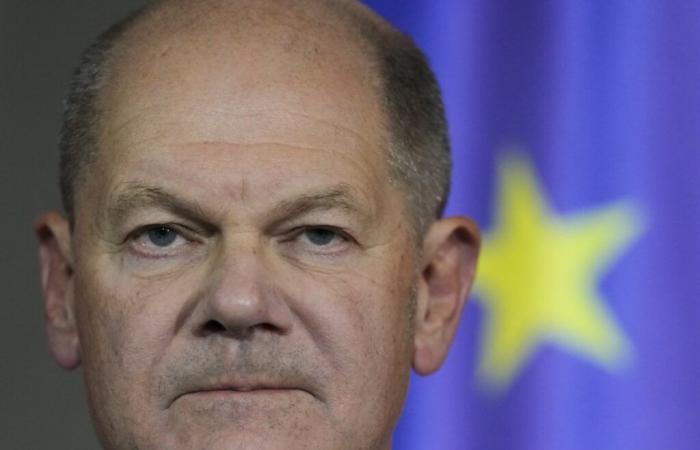Keystone-SDA
Germany has entered a period of great uncertainty. Chancellor Olaf Scholz is challenged Thursday by his conservative rivals who want a vote of confidence in Parliament next week.
This content was published on
November 07, 2024 – 11:18 am
(Keystone-ATS) The opposition wants to speed up the holding of early elections after the implosion the day before of the government coalition.
The coalition between the chancellor’s Social Democrats (SPD), the Greens and the liberals of the FDP has “failed”, noted the leader of the Christian Democratic Union (CDU) Friedrich Merz and “there is no reason to ask the question of confidence in January”, as Olaf Scholz wishes.
The end of the government comes at the worst time for Germany, grappling with a serious industrial crisis, and for Europe, which is worried about the repercussions for its trade and security of the election of Republican Donald Trump as president of the UNITED STATES.
“We simply cannot afford to have a government without a majority for several months,” insisted Mr. Merz.
The earthquake caused the collapse of the tripartite coalition in power since the end of 2021 in Berlin shakes up Olaf Scholz’s agenda. However, he will travel to Budapest during the day to meet his European counterparts and Ukrainian President Volodymyr Zelenski during meetings organized in the Hungarian capital.
Budget discrepancies
The heterogeneous German government coalition was shattered following the dismissal on Wednesday evening of Finance Minister and leader of the Liberals, Christian Lindner.
The latter will be replaced by one of Olaf Scholz’s close advisors, Jörg Kukies, a 56-year-old expert on economic issues.
Most liberals left the government, with the exception of Transport Minister Volker Wissing who announced that he was staying in the ruling team and leaving his party with which he disagrees.
Cause of the rupture: deep differences between the two camps on the budgetary and economic policy to follow, the former being in favor of reviving the stalled national economy through spending, while the Liberals advocate social cuts and a strict budgetary discipline.
“We need a government capable of acting and which has the strength to take the necessary decisions for our country,” argued the Social Democratic Chancellor.
Olaf Scholz judged that there was no longer “sufficient confidence for continued cooperation”.
He now leads a minority government and hopes to pass a few pieces of legislation deemed a priority, seeking a majority on a case-by-case basis.
End of game mid-January?
As for the 2025 budget, the preparation of which is at the origin of the current crisis, there is uncertainty. Failing adoption in Parliament, a minimum and reduced version could be applied from January.
The chancellor announced on Wednesday that he wanted to pave the way for early elections in the country by submitting to a vote of confidence in mid-January, which he has every chance of losing.
In this case, the vote, initially scheduled for September, could take place “at the latest at the end of March”.
Olaf Scholz and Christian Lindner aired their grievances through microphones. Christian Lindner has “too often betrayed my trust”, lamented Olaf Scholz, denouncing “selfish” behavior.
The former Finance Minister criticized the Chancellor for leading the country “into a phase of uncertainty” with a “calculated breakup of this coalition”.
The divorce was recorded after a final day of talks organized on Wednesday to try to save the executive led by Mr. Scholz since the end of 2021.
The Shadow of Trump
Coalition ruptures are very rare in Germany. But the government team had been undermined for months by dissensions on the economy and immigration, and by personal quarrels.
“Luckily it’s over,” headlined Der Spiegel magazine on Thursday, summarizing the general feeling. “A constellation consisting of the SPD, the Greens and the FDP has no future at federal level. Not after the probable new elections in the spring, but not in the foreseeable future either,” he believes.
Olaf Scholz hoped that the election of Donald Trump, a fan of protectionism and diplomatic confrontations, would force his coalition to close ranks. But the opposite happened.
If elections were to be held tomorrow, the conservative opposition would come out on top with more than 30% of the vote according to polls, and Friedrich Merz would be the favorite to become chancellor.
But he too would have difficulty forming a majority coalition, with the far-right AfD lying in wait in second position in the opinion polls.






